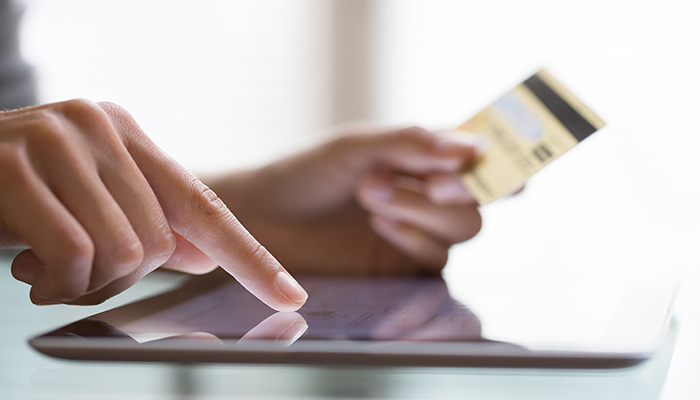Here’s why it’s critical to have well supported arguments to both questions:
Why do you want to use a credit card for big purchases?
There are numerous possible answers here. Below are the most common variations.
- Take advantage of points or rewards offered by my credit card company.
- Extend my payment timeline
- Can’t qualify for low interest financing
- Desired item is on sale; don’t have the cash on hand
Let’s address these one by one.
Cashback or credit card rewards
Credit cards are a financial tool that can help you build a strong financial foundation when used appropriately. Rewards are one reason why — and cashback rewards are particularly great because they can deliver an instant 0.5 to three percent discount on your purchases provided you pay off your credit card balance every month.
Travel points can be good too if you’re a regular traveler, but they have more noticeable drawbacks. Namely the points may be subject to blackouts or expire before you have a chance to use them. Or they may require you to spend even more money (often on the credit card) to take advantage of them when you do schedule a trip; usually for things like hotels and other travel-related expenses.
You need to be mindful that most cards offer an average of one percent in rewards and charge an average of 19.99 percent interest. Any monthly balance on your card will not only cancel out the benefits but keep you distantly on the losing end of the deal.
Extending your payment timeline
It would be incredible if everyone could afford everything they need, when they need it. Unfortunately, that’s just not the case. Cars, furnaces, relationships, and bodies all break down and the aftermath can be extremely expensive. It’s reassuring to know you have a financial tool at your disposal to spread that cost over a longer timeframe.
However, credit cards are not that tool and we caution against using them for this purpose whenever possible. While your best intentions are to pay purchases off as quickly as possible, that’s assuming other factors — including subsequent emergencies and unexpected costs — don’t prevent you from doing so.
If you have an urgent purchase and need to spread the payments out over a longer timeline, we recommend lower-interest credit vehicles like lines of credit or private financing (e.g. vehicle loans) which are far more favourable for extended repayments. In many cases the interest rate is a half or even a quarter of what credit card companies charge, with more flexible payment arrangements.
Can’t qualify for lower-interest financing
This scenario is a bit of a catch-22, because there are generally three reasons why you may not qualify for financing. Either you:
- Don’t have enough credit history for lenders to determine whether you’re a worthwhile risk
- Don’t earn enough for lenders to deem you an acceptable risk
- Have a poor credit history and lenders cannot justify extending additional credit to you
And, in these cases, making a large purchase on your credit card is all but guaranteed to make it even more difficult to secure lower-interest financing in the near to medium term.
If you have a limited or poor credit history, the purchase is likely to drive your utilization rate above 30 percent, which is the threshold lenders consider in determining whether you’re a good credit manager. Similarly, taking on that much debt is liable to make debtors similarly uncomfortable if you don’t earn enough to reliably make your payments over an extended timeline.
You’ll need to judge how important the purchase is and urgently you need to make it. But do so knowing it’s also going to make your credit decisions even more fraught in the future.
Take advantage of a great sale
You can answer this question quickly with a quick bit of mental math. Is the discount percentage higher or lower than your credit card interest rate? If it’s higher, how many months would it take the interest to overcome the discounted price? And how many months do you expect to pay off the purchase?
If you’re absolutely certain you’ll have the cash on hand to pay the purchase off before your next statement — or before credit card charges negate the savings — this may be a great opportunity. Just don’t end up paying more than you intended, and potentially more than the item itself is worth.
What’s your plan to pay the purchase off?
Regardless which of the above scenarios you fall into, if you decide to make a large purchase on your credit card you also need to have a plan to pay it off as quickly as possible. Here are some tips to get you started:
Budget
If you don’t already use a monthly budget, now’s the perfect time to start. We have several great blogs on the budgeting process and tips to make the process work for you. We also have a straightforward budget tracker spreadsheet for you to use; just enter your income and expenses.
Pay the principal
If you’re serious about paying your credit card debt off, you need to contribute more than the minimum payment on your monthly statement — which is often little more than what your card provider is charging in interest.
To determine what’s reasonable, it often helps to begin with the end in mind. Say you want to be debt free in four months: divide the purchase cost by four, then adjust that number to fit within your budget. The more you’re able to pay toward the principal, the less impact interest charges will have on that payment horizon.
Make sacrifices
Paying off that large purchase may require missing out on some things you typically enjoy for a short while. Things like dining out, cable, subscriptions, and shopping are all indulgences you may want to forego to free up some extra income for debt repayment.
Review your budget and see what costs you can set aside over your desired timeline. You may discover your path to debt freedom is even shorter than you anticipated.
Automate
Most online banking apps allow you to set up automatic payments to your credit card every month. These can help you in two ways:
- You never have to worry about forgetting to make a payment (thereby incurring added penalties and damaging your credit)
- You’re less likely to undercut your plan to pay off your debt by only making the minimum payment “just this once.”
Just make sure the payment amount fits within your monthly budget and comes out a day or two after your regular paycheque arrives to avoid potential charges for insufficient funds.
Freeze
Many credit card services also offer options to manually deactivate your card if it’s lost or stolen. This functionality is also great for stopping yourself from using the card while you’re attempting to pay it off. You can turn it back on at any time, but many people find that extra moment of reflection is all that’s needed to refocus their priorities and regain the willpower they need.
For added effectiveness, you can also do the old tried and tested trick of literally freezing your credit card in a block of ice and not thawing it until you’ve paid off that bit purchase.
Save
The best way to pay off a big credit purchase is to have the money already in your pocket. Even while you’re working at reducing your debt, try to set aside at least 10 percent of your income in an emergency fund. Most experts recommend having at least three to nine months of living expenses set aside for large and unexpected costs.
Even better is having two funds, with the second account building up for less necessary, but significantly more desirable purchases like those vacations you were trying to earn points for or that big irresistible sale. You can still use your credit card to get the points or build your credit history, but you’ll also have the money ready to pay the purchase off and get all of the benefits with none of the cost.



